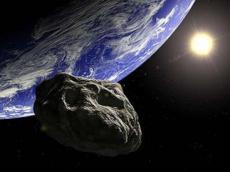|
|
TODAY.AZ / Weird / Interesting
Huge asteroid to fly safely by Earth today
17 February 2014 [14:20] - TODAY.AZ
 An asteroid the size of three football fields is set to make a close brush of Earth on Monday (Feb. 17), and you can watch the flyby in a live webcast.
An asteroid the size of three football fields is set to make a close brush of Earth on Monday (Feb. 17), and you can watch the flyby in a live webcast.Near-Earth asteroid 2000 EM26 poses no threat of actually hitting the planet, but the online Slooh Space Camera will track the asteroid as it passes by Earth on Monday. The live Slooh webcast will start at 9 p.m. EST (0200 Feb. 18 GMT), and you can also watch the webcast directly through the Slooh website.
You can also watch the asteroid broadcast live on Space.com. Scientists estimate that 2000 EM26 is about 885 feet (270 meters) in diameter, and it is whizzing through the solar system at a break-neck 27,000 mph (12.37km/s), according to Slooh. During its closest approach, the asteroid will fly about 8.8 lunar distances from Earth.
"We continue to discover these potentially hazardous asteroids — sometimes only days before they make their close approaches to Earth," Slooh's technical and research director, Paul Cox said in a statement. "Slooh’s asteroid research campaign is gathering momentum with Slooh members using the Slooh robotic telescopes to monitor this huge population of potentially hazardous space rocks. We need to find them before they find us!"
2000 EM26's flyby comes almost exactly a year after two major near-Earth object (NEO) events on Feb. 15, 2013. That day, as scientists were tracking the extremely close pass of the 98-foot (30 m) asteroid 2012 DA14, another, unrelated space rock unexpectedly exploded above Chelyabinsk, Russia, causing substantial damage to buildings that injured more than 1,000 people with falling glass.
The shockwave caused by the explosion damaged thousands of buildings and left thousands of people injured, but no one was killed. The approximately 65-foot-meteor (20 m) exploded 18 miles (29 km) above the ground, and it released the energy equivalent of about 20 atomic bombs, Slooh officials said.
"On a practical level, a previously-unknown, undiscovered asteroid seems to hit our planet and cause damage or injury once a century or so, as we witnessed on June 20, 1908 and February 15, 2013," Slooh astronomer Bob Berman said in a statement. "Every few centuries, an even more massive asteroid strikes us — fortunately usually impacting in an ocean or wasteland such an Antarctica. But the ongoing threat, and the fact that biosphere-altering events remain a real if small annual possibility, suggests that discovering and tracking all NEOs, as well as setting up contingency plans for deflecting them on short notice should the need arise, would be a wise use of resources."
Pieces of the Russian meteorite will be awarded to seven gold medal winners on Saturday at the 2014 Winter Olympics in Sochi, Russia.
The Slooh webcast will include commentary from Mark Boslough, an expert on planetary impacts. You can participate in the broadcast by using the hashtag #asteroid to ask questions during the 2000 EM26 show.
/Yahoo/
URL: http://www.today.az/news/interesting/131007.html
 Print version
Print version
Views: 2359
Connect with us. Get latest news and updates.
See Also
- 19 February 2025 [22:20]
Visa and Mastercard can return to Russia, but with restrictions - 05 February 2025 [19:41]
Japan plans to negotiate with Trump to increase LNG imports from United States - 23 January 2025 [23:20]
Dubai once again named cleanest city in the world - 06 December 2024 [22:20]
Are scented candles harmful to health? - 23 November 2024 [14:11]
Magnitude 4.5 earthquake hits Azerbaijan's Lachin - 20 November 2024 [23:30]
Launch vehicle with prototype of Starship made its sixth test flight - 27 October 2024 [09:00]
Fuel prices expected to rise in Sweden - 24 October 2024 [19:14]
Turkiye strikes terror targets in Iraq and Syria - 23 October 2024 [23:46]
Kazakhstan supplied almost entire volume of oil planned for 2024 to Germany in 9 months - 23 October 2024 [22:17]
Taiwan reported passage of Chinese Navy aircraft carrier near island
Most Popular
 Azerbaijan and Iraq expand legal cooperation through high-level judicial talks
Azerbaijan and Iraq expand legal cooperation through high-level judicial talks
 Vice-President of Heydar Aliyev Foundation Leyla Aliyeva meets with daughter of Chairman of Halk Maslahaty of Turkmenistan Oguljahan Atabayeva
Vice-President of Heydar Aliyev Foundation Leyla Aliyeva meets with daughter of Chairman of Halk Maslahaty of Turkmenistan Oguljahan Atabayeva
 EU’s recommendations on Georgia spark mixed reactions
EU’s recommendations on Georgia spark mixed reactions
 President Ilham Aliyev, Chairman of People's Council of Turkmenistan hold one-on-one meeting
President Ilham Aliyev, Chairman of People's Council of Turkmenistan hold one-on-one meeting
 President Ilham Aliyev, Chairman of Turkmenistan’s Halk Maslahaty visit Mehmandarovs' estate complex in Shusha
President Ilham Aliyev, Chairman of Turkmenistan’s Halk Maslahaty visit Mehmandarovs' estate complex in Shusha
 Health Ministry meets with Pfizer delegation to strengthen vaccine collaboration
Health Ministry meets with Pfizer delegation to strengthen vaccine collaboration
 bp deepens partnership with SOCAR-KBR through landmark project agreements
bp deepens partnership with SOCAR-KBR through landmark project agreements
